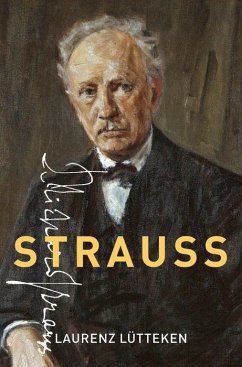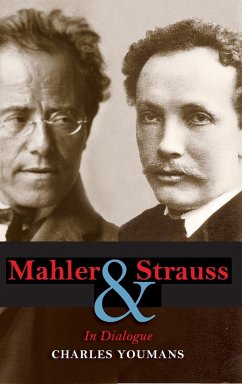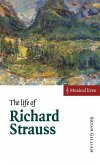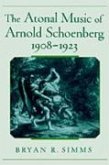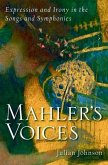Laurenz Lütteken
Strauss
Laurenz Lütteken
Strauss
- Gebundenes Buch
- Merkliste
- Auf die Merkliste
- Bewerten Bewerten
- Teilen
- Produkt teilen
- Produkterinnerung
- Produkterinnerung
Laurenz L¿tteken's Strauss presents a new approach to the life and works of Richard Strauss, cutting through the mystery and gossip surrounding the elusive German composer to reveal his complicated role as representative of modernity.
Andere Kunden interessierten sich auch für
![Mahler and Strauss Mahler and Strauss]() Charles YoumansMahler and Strauss38,99 €
Charles YoumansMahler and Strauss38,99 €![The Strauss Dynasty and Habsburg Vienna The Strauss Dynasty and Habsburg Vienna]() David Wyn JonesThe Strauss Dynasty and Habsburg Vienna32,99 €
David Wyn JonesThe Strauss Dynasty and Habsburg Vienna32,99 €![The Life of Richard Strauss The Life of Richard Strauss]() Bryan GilliamThe Life of Richard Strauss58,99 €
Bryan GilliamThe Life of Richard Strauss58,99 €![Dearest Lenny Dearest Lenny]() Mari YoshiharaDearest Lenny34,99 €
Mari YoshiharaDearest Lenny34,99 €![The Atonal Music of Arnold Schoenberg, 1908-1923 The Atonal Music of Arnold Schoenberg, 1908-1923]() Bryan R SimmsThe Atonal Music of Arnold Schoenberg, 1908-1923205,99 €
Bryan R SimmsThe Atonal Music of Arnold Schoenberg, 1908-1923205,99 €![Mahler's Voices Mahler's Voices]() Julian JohnsonMahler's Voices99,99 €
Julian JohnsonMahler's Voices99,99 €![Richard Strauss Richard Strauss]() Bryan GilliamRichard Strauss19,95 €
Bryan GilliamRichard Strauss19,95 €-
-
-
Laurenz L¿tteken's Strauss presents a new approach to the life and works of Richard Strauss, cutting through the mystery and gossip surrounding the elusive German composer to reveal his complicated role as representative of modernity.
Hinweis: Dieser Artikel kann nur an eine deutsche Lieferadresse ausgeliefert werden.
Hinweis: Dieser Artikel kann nur an eine deutsche Lieferadresse ausgeliefert werden.
Produktdetails
- Produktdetails
- Verlag: Oxford University Press
- Seitenzahl: 304
- Erscheinungstermin: 29. März 2019
- Englisch
- Abmessung: 241mm x 159mm x 30mm
- Gewicht: 589g
- ISBN-13: 9780190605698
- ISBN-10: 0190605693
- Artikelnr.: 54600314
- Herstellerkennzeichnung
- Libri GmbH
- Europaallee 1
- 36244 Bad Hersfeld
- gpsr@libri.de
- Verlag: Oxford University Press
- Seitenzahl: 304
- Erscheinungstermin: 29. März 2019
- Englisch
- Abmessung: 241mm x 159mm x 30mm
- Gewicht: 589g
- ISBN-13: 9780190605698
- ISBN-10: 0190605693
- Artikelnr.: 54600314
- Herstellerkennzeichnung
- Libri GmbH
- Europaallee 1
- 36244 Bad Hersfeld
- gpsr@libri.de
Laurenz Lütteken is Professor and Chair of Musicology at the University of Zurich. He has published numerous works on Richard Strauss and is the general editor of the music encyclopedia MGG Online.
* Foreword
* Introduction: Problems
* 1. Images of Strauss
* 2. The Other Modernism
* I. Between Patriciate and Aristocracy
* 1. Munich as a Form of Mental Life
* 2. Family and Milieu
* 3. Education and Readings`
* II. The End of the Nineteenth Century: Leaving Traditional Genres
Behind
* 1. Strauss and Tradition
* 2. Inspiration and Compositional Craft
* 3. Against Sonata Form: The End of Symphonic and Chamber Music
* III. The Poetry of Imagination: Lieder
* 1. The Lied as a Form of Musical Thought
* 2. Strauss as Reader and the Poetic Canon
* 3. Border-crossings: Lyric and Chorus
* 4. First and Last Lieder
* IV. Music and Life: The Kapellmeister and His Duties
* 1. Beginnings: Meiningen, Weimar, Munich
* 2. Berlin and Modernism
* 3. Vienna and the Republican Task
* 4. Strauss as Conductor
* V. Poetry of the Real: The Tone Poems
* 1. Distance from Wagner 2. Leaving Behind the Metaphysics of Music 3.
"Autobiography" and New Musical Semantics
* VI. Music Without Metaphysics: The Path to Opera
* 1. Künstleropern
* 2. The New Theater: Max Reinhardt in Berlin
* 3. Oriental Antiquity and "Nervous Counterpoint"
* 4. The End of Instrumental Music
* VII. "The Social Achieved": Strauss und Hofmannsthal
* 1. Language-crises and "Way to the Social"
* 2. Silence and Dance
* 3. Plastic Antiquity
* 4. A New Reality: Fairytale and Operetta
* VIII. New Mythology and the Plasticity of Music
* 1. Mozart's Melody and Wagner's Orchestra: Tonality and the New
Musical Communicability 2. The Present and Presence of the Theater
* 3. Music as Festival: Salzburg
* IX. Music and Reality
* 1. Life-Worlds: Social Praxis and the Villas in Garmisch and Vienna
2. Copyright and Musical Materiality
* 3. The Reichsmusikkammer
* X. After Hofmannsthal's Death
* 1. Intermezzo with Stefan Zweig
* 2. Joseph Gregor and Final Plans
* XI. Metamorphosen and the End of History
* 1. Final Works
* 2. Self-Interpretations: Metamorphosen
* 3. The New Presence of History?
* Appendices
* A. Biographical Timeline
* B. Catalog of Works
* C. Personalia
* Select Bibliography
* Introduction: Problems
* 1. Images of Strauss
* 2. The Other Modernism
* I. Between Patriciate and Aristocracy
* 1. Munich as a Form of Mental Life
* 2. Family and Milieu
* 3. Education and Readings`
* II. The End of the Nineteenth Century: Leaving Traditional Genres
Behind
* 1. Strauss and Tradition
* 2. Inspiration and Compositional Craft
* 3. Against Sonata Form: The End of Symphonic and Chamber Music
* III. The Poetry of Imagination: Lieder
* 1. The Lied as a Form of Musical Thought
* 2. Strauss as Reader and the Poetic Canon
* 3. Border-crossings: Lyric and Chorus
* 4. First and Last Lieder
* IV. Music and Life: The Kapellmeister and His Duties
* 1. Beginnings: Meiningen, Weimar, Munich
* 2. Berlin and Modernism
* 3. Vienna and the Republican Task
* 4. Strauss as Conductor
* V. Poetry of the Real: The Tone Poems
* 1. Distance from Wagner 2. Leaving Behind the Metaphysics of Music 3.
"Autobiography" and New Musical Semantics
* VI. Music Without Metaphysics: The Path to Opera
* 1. Künstleropern
* 2. The New Theater: Max Reinhardt in Berlin
* 3. Oriental Antiquity and "Nervous Counterpoint"
* 4. The End of Instrumental Music
* VII. "The Social Achieved": Strauss und Hofmannsthal
* 1. Language-crises and "Way to the Social"
* 2. Silence and Dance
* 3. Plastic Antiquity
* 4. A New Reality: Fairytale and Operetta
* VIII. New Mythology and the Plasticity of Music
* 1. Mozart's Melody and Wagner's Orchestra: Tonality and the New
Musical Communicability 2. The Present and Presence of the Theater
* 3. Music as Festival: Salzburg
* IX. Music and Reality
* 1. Life-Worlds: Social Praxis and the Villas in Garmisch and Vienna
2. Copyright and Musical Materiality
* 3. The Reichsmusikkammer
* X. After Hofmannsthal's Death
* 1. Intermezzo with Stefan Zweig
* 2. Joseph Gregor and Final Plans
* XI. Metamorphosen and the End of History
* 1. Final Works
* 2. Self-Interpretations: Metamorphosen
* 3. The New Presence of History?
* Appendices
* A. Biographical Timeline
* B. Catalog of Works
* C. Personalia
* Select Bibliography
* Foreword
* Introduction: Problems
* 1. Images of Strauss
* 2. The Other Modernism
* I. Between Patriciate and Aristocracy
* 1. Munich as a Form of Mental Life
* 2. Family and Milieu
* 3. Education and Readings`
* II. The End of the Nineteenth Century: Leaving Traditional Genres
Behind
* 1. Strauss and Tradition
* 2. Inspiration and Compositional Craft
* 3. Against Sonata Form: The End of Symphonic and Chamber Music
* III. The Poetry of Imagination: Lieder
* 1. The Lied as a Form of Musical Thought
* 2. Strauss as Reader and the Poetic Canon
* 3. Border-crossings: Lyric and Chorus
* 4. First and Last Lieder
* IV. Music and Life: The Kapellmeister and His Duties
* 1. Beginnings: Meiningen, Weimar, Munich
* 2. Berlin and Modernism
* 3. Vienna and the Republican Task
* 4. Strauss as Conductor
* V. Poetry of the Real: The Tone Poems
* 1. Distance from Wagner 2. Leaving Behind the Metaphysics of Music 3.
"Autobiography" and New Musical Semantics
* VI. Music Without Metaphysics: The Path to Opera
* 1. Künstleropern
* 2. The New Theater: Max Reinhardt in Berlin
* 3. Oriental Antiquity and "Nervous Counterpoint"
* 4. The End of Instrumental Music
* VII. "The Social Achieved": Strauss und Hofmannsthal
* 1. Language-crises and "Way to the Social"
* 2. Silence and Dance
* 3. Plastic Antiquity
* 4. A New Reality: Fairytale and Operetta
* VIII. New Mythology and the Plasticity of Music
* 1. Mozart's Melody and Wagner's Orchestra: Tonality and the New
Musical Communicability 2. The Present and Presence of the Theater
* 3. Music as Festival: Salzburg
* IX. Music and Reality
* 1. Life-Worlds: Social Praxis and the Villas in Garmisch and Vienna
2. Copyright and Musical Materiality
* 3. The Reichsmusikkammer
* X. After Hofmannsthal's Death
* 1. Intermezzo with Stefan Zweig
* 2. Joseph Gregor and Final Plans
* XI. Metamorphosen and the End of History
* 1. Final Works
* 2. Self-Interpretations: Metamorphosen
* 3. The New Presence of History?
* Appendices
* A. Biographical Timeline
* B. Catalog of Works
* C. Personalia
* Select Bibliography
* Introduction: Problems
* 1. Images of Strauss
* 2. The Other Modernism
* I. Between Patriciate and Aristocracy
* 1. Munich as a Form of Mental Life
* 2. Family and Milieu
* 3. Education and Readings`
* II. The End of the Nineteenth Century: Leaving Traditional Genres
Behind
* 1. Strauss and Tradition
* 2. Inspiration and Compositional Craft
* 3. Against Sonata Form: The End of Symphonic and Chamber Music
* III. The Poetry of Imagination: Lieder
* 1. The Lied as a Form of Musical Thought
* 2. Strauss as Reader and the Poetic Canon
* 3. Border-crossings: Lyric and Chorus
* 4. First and Last Lieder
* IV. Music and Life: The Kapellmeister and His Duties
* 1. Beginnings: Meiningen, Weimar, Munich
* 2. Berlin and Modernism
* 3. Vienna and the Republican Task
* 4. Strauss as Conductor
* V. Poetry of the Real: The Tone Poems
* 1. Distance from Wagner 2. Leaving Behind the Metaphysics of Music 3.
"Autobiography" and New Musical Semantics
* VI. Music Without Metaphysics: The Path to Opera
* 1. Künstleropern
* 2. The New Theater: Max Reinhardt in Berlin
* 3. Oriental Antiquity and "Nervous Counterpoint"
* 4. The End of Instrumental Music
* VII. "The Social Achieved": Strauss und Hofmannsthal
* 1. Language-crises and "Way to the Social"
* 2. Silence and Dance
* 3. Plastic Antiquity
* 4. A New Reality: Fairytale and Operetta
* VIII. New Mythology and the Plasticity of Music
* 1. Mozart's Melody and Wagner's Orchestra: Tonality and the New
Musical Communicability 2. The Present and Presence of the Theater
* 3. Music as Festival: Salzburg
* IX. Music and Reality
* 1. Life-Worlds: Social Praxis and the Villas in Garmisch and Vienna
2. Copyright and Musical Materiality
* 3. The Reichsmusikkammer
* X. After Hofmannsthal's Death
* 1. Intermezzo with Stefan Zweig
* 2. Joseph Gregor and Final Plans
* XI. Metamorphosen and the End of History
* 1. Final Works
* 2. Self-Interpretations: Metamorphosen
* 3. The New Presence of History?
* Appendices
* A. Biographical Timeline
* B. Catalog of Works
* C. Personalia
* Select Bibliography

